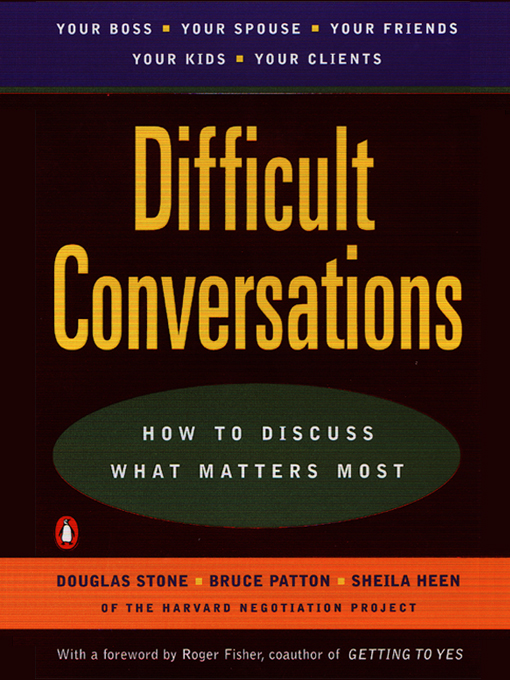Difficult Conversations: How to Discuss What Matters Most - Stone, Douglas

## Metadata
- Author: **Stone, Douglas**
- Full Title: Difficult Conversations: How to Discuss What Matters Most
- Category: #books
## Highlights
- Surprisingly, despite what appear to be infinite variations, all difficult conversations share a common structure. When you’re caught up in the details and anxiety of a particular difficult conversation, this structure is hard to see. But understanding that structure is essential to improving how you handle your most challenging conversations. ([View Highlight](https://read.readwise.io/read/01k17gg7tavnzmgn9g1zmybapk))
- difficult conversations are almost never about getting the facts right. They are about conflicting perceptions, interpretations, and values. ([View Highlight](https://read.readwise.io/read/01k1a4m2hdhhp7ncm0xhasjgnq))
- The problem with this reasoning is that it fails to take account of one simple fact: difficult conversations do not just *involve* feelings, they are at their very core *about* feelings. Feelings are not some noisy byproduct of engaging in difficult talk, they are an integral part of the conflict. Engaging in a difficult conversation without talking about feelings is like staging an opera without the music. You’ll get the plot but miss the point. In the conversation between Jack and Michael, for example, Jack never explicitly says that he feels mistreated or underappreciated, yet months later Jack can still summon his anger and resentment toward Michael. ([View Highlight](https://read.readwise.io/read/01k1a59557fa63f5rhtckpc82y))
- There’s only one way to come to understand the other person’s story, and that’s by being curious. Instead of asking yourself, “How can they think that?!” ask yourself, “I wonder what information they have that I don’t?” Instead of asking, “How can they be so irrational?” ask, “How might they see the world such that their view makes sense?” Certainty locks us out of their story; curiosity lets us in. ([View Highlight](https://read.readwise.io/read/01k1htcy29fk61ghm7hy0vp1a2))
- The question of who intended what is central to our story about what’s happening in a difficult situation. Intentions strongly influence our judgments of others: If someone intended to hurt us, we judge them more harshly than if they hurt us by mistake. We’re willing to be inconvenienced by someone if they have a good reason; we’re irritated if we think they just don’t care about the impact of their actions on us. Though either blocks our way just as surely, we react differently to an ambulance double-parked on a narrow street than we do to a BMW. ([View Highlight](https://read.readwise.io/read/01k1htehmqt03xp805jgf1s9r4))
- You blame your assistant, not just because she’s a convenient target for your frustration or because letting others know it was she and not you who screwed up may help salvage your reputation, but because it is the simple truth: this was her fault. ([View Highlight](https://read.readwise.io/read/01k1htgkxrm4yqm1zass3147hx))
- **Make Your Observations and Reasoning Explicit.** To make sure that you’re working from the same information and understand each other’s interpretations, share, as specifically as you can recall it what the other person did or said that triggered your reaction. Sydney might say, for example, “When you stroked my hair or asked if we could spend some private time at the beach, I was confused about what you wanted from our relationship. And I began to worry that if you wanted romance, then I would have a real problem on my hands.”
Or Toby could tell Eng-An: “When you left the house last night in the middle of our fight, I felt abandoned and angry. I think that’s why I picked a fight with you this morning over the orange juice. I needed to reconnect with you, even if it was just by yelling at you.” By jotting down the things that triggered you to react, you are starting to get a handle on the actions and reactions that make up the contribution system.
**Clarify What You Would Have Them Do Differently.** In addition to explaining what triggered your reaction, you should be prepared to say what you would have them do differently in the future, and explain how this would help *you* behave differently as well. ([View Highlight](https://read.readwise.io/read/01k1htv4cnp940ecjde04cnyaj))
- There are ways to manage the problem of feelings. Working to get feelings into the conversation is almost always helpful as long as you do so in a purposive way. While the drawbacks of avoiding feelings are inevitable, the drawbacks of sharing feelings are not. If you are able to share feelings with skill, you can avoid many of the potential costs associated with expressing feelings and even reap some unexpected benefits. This is the way out of the feelings bind. ([View Highlight](https://read.readwise.io/read/01k1htx5nn5pbmhmkqk7kd7qqd))
- After observing O Sensei, the founder of Aikido, sparring with an accomplished fighter, a young student said to the master, “You never lose your balance. What is your secret?”
“You are wrong,” O Sensei replied. “I am constantly losing my balance. My skill lies in my ability to regain it.”
So it is with difficult conversations. ([View Highlight](https://read.readwise.io/read/01k1mf8c7ebrrcrqhren4y02gf))
- Sometimes you’ll find that you are just too close to the problem and too overwhelmed by your internal identity quake to engage effectively in the conversation. You’re not at a place where you can take in more information or untangle your thoughts. Maintaining the charade of participation in the conversation at times like this is unlikely to be helpful to anyone.
Ask for some time to think about what you’ve heard: “I’m surprised by your reaction to this and would like some time to think about what you’ve said.” Even ten minutes can help. Take a walk. Get some air. ([View Highlight](https://read.readwise.io/read/01k1mfr2nzeep7c2kavtd0pbsd))